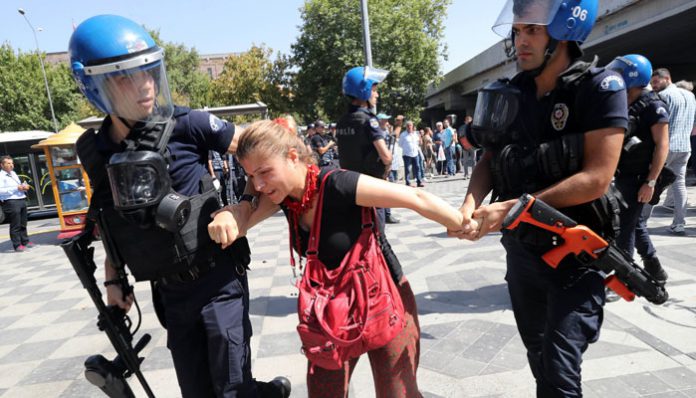Riot police officers detain protesters during the trial of two Turkish teachers, who went on a hunger strike over their sacking under a government decree following the failed 2016 coup, outside of a courthouse in Ankara, Turkey, September 14, 2017. Two imprisoned Turkish teachers who have been on a hunger strike for six months to protest their sacking in a mass purge went on trial today charged with terror-related offences. The case of academic Nuriye Gulmen and teacher Semih Ozakca, who have been jailed since May, has become a rallying cause for critics of the crackdown that followed the July 15 failed coup aimed at ousting President Recep Tayyip Erdogan. / AFP PHOTO / ADEM ALTAN
There have been gross human rights violations, a regression in freedom of speech and a return to the dark days of the 1990s, which were dominated by countless unsolved murders, during the 18-year-long rule of the Justice and Development Party (AKP) in Turkey, according to a report from an opposition deputy.
The “AKP-era Human Rights Report,” drafted by main opposition Republican People’s Party (CHP) deputy Alpay Antman, looks at developments in Turkey in the fields of human rights, law, media, women’s rights and education.
“Turkey has gone backward in many areas during AKP rule. All citizens, women and youth in particular, have been dragged into darkness in social, political and economic life. Cases of domestic violence and child abuse have increased. Instead of a modern and progressive mentality in education, a religious mentality has been adopted,” said Antman.
According to the report 432 murders that have occurred since the AKP came to power in 2002 remain unsolved. Inquiries submitted by opposition deputies to parliament demanding investigations into the murders have been rejected 22 times by the AKP.
In the same period 160 media organizations including 30 TV stations, 30 radio stations, 47 newspapers, 18 magazines, six news agencies and 29 publishing houses, have been closed down, while 2,360 books have been seized.
The report showed that the AKP’s control over the public became stronger after the country switched from a parliamentary system to a presidential system of governance through a referendum in 2017, which granted AKP leader and President Recep Tayyip Erdoğan vast powers.
As of October 2020, 74 journalists were being held in Turkey’s prisons, making Turkey along with China the top jailers of journalists in the world.
Reporters Without Borders (RSF) described Turkey as “the world’s biggest jailer of professional journalists” in its 2020 World Press Freedom Index, in which Turkey was ranked 154th among 180 countries in terms of press freedom.
In addition Turkey has been fined by the European Court of Human Rights 20 times for its violation of the right to a fair trial and 28 times for its violation of freedom of expression, putting Turkey at the top of European countries for number of rights violations.
The Strasbourg-based court has imposed fines totaling TL 295 million on Turkey over the past 16 years for rights violations, with Turkey topping the list of countries with the highest number of rights violation decisions from the court, currently standing at 3,128.
Mass purges following July 15 coup
Turkey saw a mass purge of public servants following a coup attempt on July 15, 2016, with more than 130,000 civil servants removed from their jobs on terrorism accusations.
The purged public servants include 60,532 teachers, 5,705 academics and 2,431 judges and prosecutors. Following the coup attempt 209 journalists were arrested, while 2,500 journalists were fired from their jobs.
Following a military coup in Turkey in 1980, the number of purged public servants was fewer as 3,854 teachers, 120 academics and 47 judges were removed from their posts while 31 journalists were arrested.
Gender gap deepened
While Turkey was ranked 130th among 140 countries in the World Economic Forum’s Gender Gap Index in 2016, its ranking was 131 in 2017, 130 among 149 countries in 2018 and 130 again among 153 countries in 2020.
The number of domestic violence cases has increased to 400 per thousand over the last decade, and at least 7,500 women have been killed by men over the past 18 years.
Regarding the abuse of children, in 2006 courts heard 3,778 child abuse trials, while 21,189 cases were filed in 2016 and 28,360 in 2019. Close to 60 percent of defendants were convicted in these cases. Child sexual abuse cases have increased by 443 percent over the past 14 years.
Source: Turkish Minute



